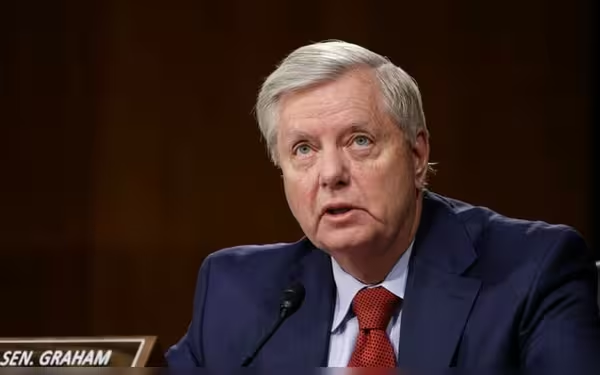Saturday, November 16, 2024 05:44 PM
Lindsey Graham Urges Saudi Arabia, Israel to Formalize Ties
- Graham calls for Saudi-Israeli ties by year-end.
- Potential defense treaty likened to Japan, Australia.
- Palestinian issue complicates formalization efforts.
 Image Credits: tribune.com.pk
Image Credits: tribune.com.pkUS Senator Lindsey Graham urges Saudi Arabia and Israel to formalize ties by year-end, emphasizing the urgency amid evolving geopolitical dynamics.
In a significant diplomatic push, US Senator Lindsey Graham has called for Saudi Arabia and Israel to formalize their ties by the end of this year. This appeal comes at a time when the geopolitical landscape in the Middle East is rapidly evolving, and the relationships between these nations are becoming increasingly important. Graham's remarks highlight the urgency of establishing a formal agreement, as he warned that the next US administration may not have the necessary support to back such a deal.
During a press conference in Jerusalem, Graham emphasized the potential benefits of a treaty between the United States and Saudi Arabia, akin to the defense agreements currently in place with Japan and Australia. He stated, "We can get you a treaty through the Senate between the United States and Saudi Arabia, a defense agreement like you have in Japan and Australia, if you do it on President Biden’s watch." This statement underscores the importance of timing in international relations, particularly as the political climate in the US may shift with the upcoming elections.
The relationship between Saudi Arabia and Israel has been a topic of discussion for many years. Both nations share common interests, particularly in countering regional threats and promoting stability in the Middle East. Establishing formal ties could pave the way for enhanced cooperation in various sectors, including security, trade, and technology.
However, the path to formalizing these ties is not without challenges. There are numerous political, cultural, and historical factors that could complicate the process. For instance, the Palestinian issue remains a significant point of contention in the region, and any agreement would need to address the concerns of all parties involved.
Senator Graham's call for Saudi Arabia and Israel to formalize their ties is a crucial step towards fostering stability in the Middle East. As the world watches closely, the actions taken in the coming months will be pivotal in shaping the future of these relationships. It is essential for leaders in the region to seize this opportunity and work towards a peaceful and prosperous future, not just for their nations, but for the entire region. The potential for collaboration is immense, and with the right approach, a new chapter in Middle Eastern diplomacy could be on the horizon.













